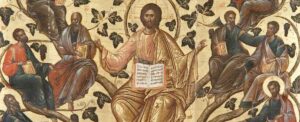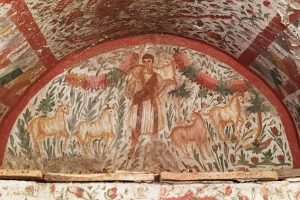
Elder Epiphanios was asked:
Are Christians allowed to take psychiatric medicines? Because many maintain that anxiety, depression, melancholy and, in general, psychiatric disorders of the soul are healed only with spiritual life: that is, with prayer, going to church, confession, Holy Communion, etc.
When necessary, the Christian must also take them.
But what can these medications do for the soul of man?
We must clarify from the beginning that the so-called psychiatric medicines or tranquilizers — that is, these material substances — cannot in any way give man’s soul the longed-for calmness, nor to bring consolation and hope to the soul of a mother, for example, whose son has died, nor even to deliver the conscience of a man from the guilt of the sins which he has committed. These gifts “come down only from above, from the Father of lights.” And only the celebrants (the priests and, furthermore, the spiritual fathers) of the Church are able to heal these conditions of people.
Then why did you say that psychiatric medications are necessary?
Listen, anxiety and depression in people are caused not only by such above-mentioned factors, or even from financial ruin or from repression of their personalities and loss of self-esteem, etc., but also from factors which originate in the nervous system (the brain) of man — in other words, from the disturbance of the higher functions of the brain, such as emotion, thought, will, etc. This type of anxiety or depression, etc. is improved or even healed with psychiatric medicines, medicines, that is, which act on the brain functions in such a way as to bring them back to their normal rhythm.
To put it more simply, many Christians focus their attention on the immaterial component of man — that is, the soul, attributing to her alone the manifestations of anxiety, melancholy, etc. and thus they reject the medicines given the fact that matter cannot affect the immaterial. They forget though, that man also has a body. And because the brain, through which the soul is expressed, is an instrument of the body, with material means (that is, with medicines or earlier on with insulin comas or electroshock) its disturbances must be dealt with.
What do you mean when you say that soul expresses itself through the brain?
An image which we can use to describe the relationship of soul and brain is the violin with the violinist. Just as even the best musician cannot make good music if the the violin is broken or unstrung, in the same manner man’s behavior will not be whole (see 2 Tim. 3:17) if his brain presents a certain disturbance, in which case the soul cannot be expressed correctly. It is precisely this disturbance of the brain that certain medicines help correct and so aid the soul in expressing itself correctly.
Let me ask something else. Can intense sacramental life or fervent prayer heal these disturbances of the brain?
Of course, God can do a miracle for these sufferings. The question, however, which was posed to me in the beginning was something else. I was asked if Christians are allowed to use psychiatric medicines. And to this I respond undoubtedly: Yes!
Simultaneously, however, I also ask you: Why don’t you ask the same questions about bronchial asthma, for example, or eczema or migraine headaches or glaucoma or intestinal ulcers, etc. etc.? Let us finally realize that anxiety or melancholy, etc. does not come only from the disturbance of the soul, but also from the disturbance of the brain or from a combination of the two. In the final case, psychological support is also needed (the solution of problems, selfless assistance, behavior salted with the salt of discernment, so that those who pose such problems do not feel difficulty from the manifestations of our love, examination from an educated, pious psychiatrist who will also enlighten them about the nature of the disturbances, the invocation of divine aid, the approaching to the Sacraments of the Church, etc.) and simultaneously a medical therapy.
Elder Epiphanios (Theodoropoulos) was a priestmonk in the twentieth century who served the Church in Athens.






